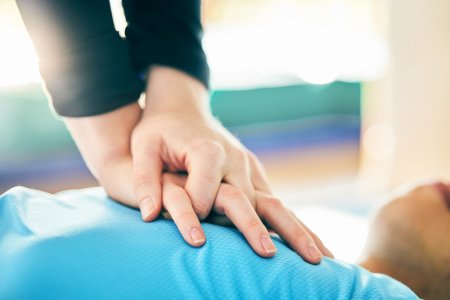How the New CPR Campaign Could Save Your Life Amidst Australia's Surging Cardiac Arrest Rates!
By
Seia Ibanez
- Replies 4
The tranquility of K'gari's sunrise and the serene waters of Hervey Bay paint a picture of peace and calm, but for 75-year-old Greg Messer and his partner Nicola Wellings, these waters are also a reminder of life's fragility. Greg's routine swim after a triathlon in October 2020 took a dramatic turn when he suffered a cardiac arrest and was clinically dead for over 15 minutes. The quick response of bystanders, including lifesavers and off-duty medical staff, who performed CPR and used an automated external defibrillator (AED), was pivotal in saving his life.
Greg's harrowing experience is not an isolated incident. In Australia, nearly 70 people suffer a cardiac arrest outside of a hospital every day, with a survival rate of only 10 percent. This stark statistic is primarily due to delays in receiving CPR, defibrillation, and emergency services treatment, as reported by the National Heart Foundation of Australia.
Recognizing the urgent need to improve these survival rates, Monash University's Professor Janet Gray spearheaded a campaign to make a change. Traditional, expensive cardiac arrest education campaigns have shown diminishing returns over time, prompting Professor Gray and her colleagues to delve into the data of more than 62,000 out-of-hospital cardiac arrests from 2017-2019 in Australia and New Zealand. Their findings, published in the journal PLOS One, identified 60 local government areas with a high risk of cardiac arrests and low rates of bystander CPR assistance.
In areas like Queensland's Fraser Coast, where Greg and Nicola reside, bystander CPR assistance was given in less than 59 percent of incidents, one of the lowest rates in the country. The couple is acutely aware of how close Greg came to becoming another grim statistic and are eternally grateful to those who knew CPR and acted swiftly.
The trauma of the event lingered for Nicola and others who witnessed it, highlighting the far-reaching impact such incidents can have on communities. This underscores the importance of widespread CPR knowledge and the confidence to act in emergencies.
Professor Gray's research points to confidence and frailty as significant barriers to performing CPR, especially in regions with older populations. The fear of causing harm can deter individuals from taking action. CJ Beazley, a trainer with St John Ambulance, emphasizes that education is the key to overcoming these barriers. He shares stories of students who, after learning CPR, were able to apply their knowledge in real-life situations effectively.
Greg, diagnosed with hypertrophic cardiomyopathy and now fitted with a defibrillator, continues to lead an active lifestyle, including a daily regimen of gym workouts, ocean swims, and bike rides. He and Nicola are preparing for their next challenge—an 8km swim from Magnetic Island to Townsville, with Nicola supporting from a kayak. Greg's philosophy is to 'finish alive,' listening to his body and his defibrillator, which has activated twice during swims when he pushed himself too hard.
The new CPR campaign aims to target high-risk areas with tailored education and awareness programs to improve bystander response rates. By addressing the specific needs and concerns of these communities, the campaign hopes to empower more individuals to act confidently in the face of cardiac emergencies.
For our readers, this campaign could be a lifesaver. Learning CPR and understanding how to use an AED can make the difference between life and death. We encourage you to seek out local CPR courses and familiarize yourself with the locations of AEDs in your community. Your actions could save a life, perhaps even your own.

We'd love to hear from you, members of the Seniors Discount Club. Have you or someone you know been affected by a cardiac arrest? Have you taken a CPR course recently, or do you plan to? Share your stories and thoughts in the comments below, and let's raise awareness together for this life-saving skill. Remember, in the face of cardiac arrest, every second counts, and your knowledge and confidence could be the key to survival.
Greg's harrowing experience is not an isolated incident. In Australia, nearly 70 people suffer a cardiac arrest outside of a hospital every day, with a survival rate of only 10 percent. This stark statistic is primarily due to delays in receiving CPR, defibrillation, and emergency services treatment, as reported by the National Heart Foundation of Australia.
Recognizing the urgent need to improve these survival rates, Monash University's Professor Janet Gray spearheaded a campaign to make a change. Traditional, expensive cardiac arrest education campaigns have shown diminishing returns over time, prompting Professor Gray and her colleagues to delve into the data of more than 62,000 out-of-hospital cardiac arrests from 2017-2019 in Australia and New Zealand. Their findings, published in the journal PLOS One, identified 60 local government areas with a high risk of cardiac arrests and low rates of bystander CPR assistance.
In areas like Queensland's Fraser Coast, where Greg and Nicola reside, bystander CPR assistance was given in less than 59 percent of incidents, one of the lowest rates in the country. The couple is acutely aware of how close Greg came to becoming another grim statistic and are eternally grateful to those who knew CPR and acted swiftly.
The trauma of the event lingered for Nicola and others who witnessed it, highlighting the far-reaching impact such incidents can have on communities. This underscores the importance of widespread CPR knowledge and the confidence to act in emergencies.
Professor Gray's research points to confidence and frailty as significant barriers to performing CPR, especially in regions with older populations. The fear of causing harm can deter individuals from taking action. CJ Beazley, a trainer with St John Ambulance, emphasizes that education is the key to overcoming these barriers. He shares stories of students who, after learning CPR, were able to apply their knowledge in real-life situations effectively.
Greg, diagnosed with hypertrophic cardiomyopathy and now fitted with a defibrillator, continues to lead an active lifestyle, including a daily regimen of gym workouts, ocean swims, and bike rides. He and Nicola are preparing for their next challenge—an 8km swim from Magnetic Island to Townsville, with Nicola supporting from a kayak. Greg's philosophy is to 'finish alive,' listening to his body and his defibrillator, which has activated twice during swims when he pushed himself too hard.
The new CPR campaign aims to target high-risk areas with tailored education and awareness programs to improve bystander response rates. By addressing the specific needs and concerns of these communities, the campaign hopes to empower more individuals to act confidently in the face of cardiac emergencies.
For our readers, this campaign could be a lifesaver. Learning CPR and understanding how to use an AED can make the difference between life and death. We encourage you to seek out local CPR courses and familiarize yourself with the locations of AEDs in your community. Your actions could save a life, perhaps even your own.
Key Takeaways
- Greg Messer survived a cardiac arrest due to the timely CPR and defibrillation provided by bystanders, underscoring the importance of immediate response in such emergencies.
- Research by Monash University identified 60 local government areas in Australia with a high risk of out-of-hospital cardiac arrest and low rates of bystander CPR assistance.
- The findings highlight the need for targeted campaigns to improve awareness and knowledge of CPR, especially in high-risk, regional areas with older populations.
- Confidence to perform CPR and overcoming the fear of causing harm are key factors that can increase the likelihood of bystander CPR assistance, potentially saving more lives.
We'd love to hear from you, members of the Seniors Discount Club. Have you or someone you know been affected by a cardiac arrest? Have you taken a CPR course recently, or do you plan to? Share your stories and thoughts in the comments below, and let's raise awareness together for this life-saving skill. Remember, in the face of cardiac arrest, every second counts, and your knowledge and confidence could be the key to survival.








